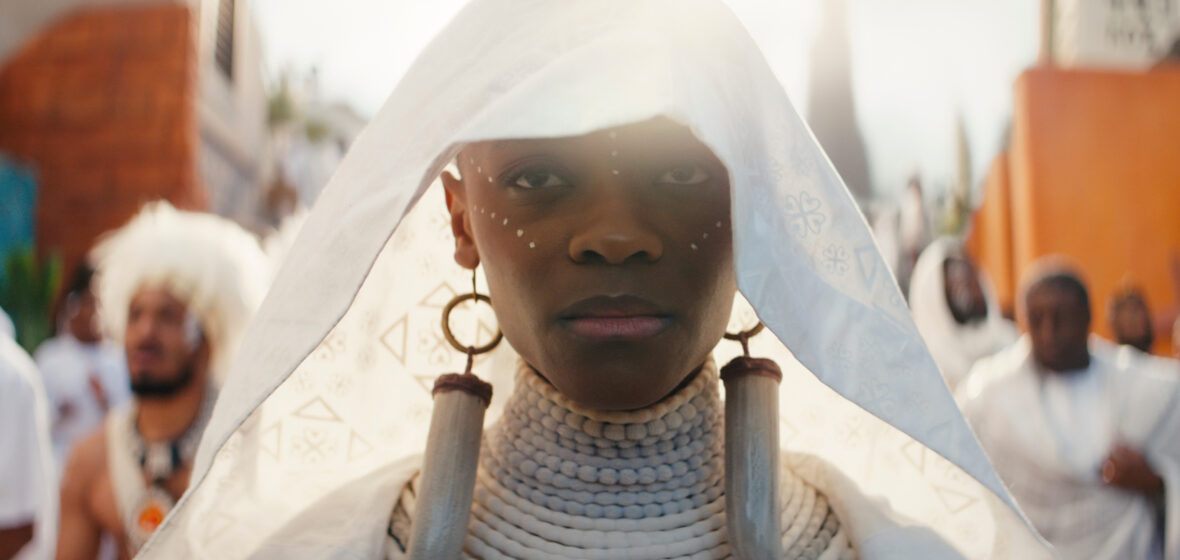Rating: Three out of five
Black Panther: Wakanda Forever addresses the big elephant in the room on the frame. The premature death of its star Chadwick Boseman sent the production of the Black Panther sequel down the path of sorrow. The original film was a landmark, a celebration of African culture that introduced the idea of Africa untouched by colonialism to the mainstream. For all the constraints of the Marvel Studio formula and Disney’s policy of avoiding any radical political message, the original Black Panther was a defying blockbuster piece of cinema that galvanised a subculture usually forgotten in big studio movies. Granted, filmmaker Ryan Coogler and his team still bowed down to the pacifist idea that change comes only with dialogue – even when the film starts with someone recovering an African artifact from the British Museum.
Chadwick Boseman was the heart and soul of the first Black Panther. A man of quiet demeanour, he was a bona fide star, with such a tranquil bearing you trusted he could leap in, save the day and do the right thing when the dust had settled. His passing was not just a loss for the Marvel Cinematic Universe, but also for cinema in general – he had everything required to make him the next greatest actor in Hollywood.
The solution for Coogler and Marvel producer Kevin Feige was easy – the sequel had to be about Boseman/T’Chala. But what else can Marvel say after spending its last 10 films dealing with the traumatic repercussions of loss? The answer has been to make this one all about grief.
Because the show has to go on, however, everything planned for this film, including the introduction of new characters, could not be dispensed with. And that’s a problem, because it’s meant that Black Panther: Wakanda Forever is a film divided into two. It’s about the need for T’Chala’s grieving family to accept they must move on after his passing, and it’s also about the story of a nation facing an invasion. And the sad thing is, the two story lines don’t quite connect, and it is clear which one needed to go.
The film starts with the passing of T’Chala while his sister, the precocious Shuri (Letitia Wright), scrambles to find a cure for the disease affecting him. One year later, Queen Ramonda (Angela Bassett) addresses the United Nations on the issue that other superpowers, especially France and the US, are pursuing control of the rare material that provides the Kingdom of Wakanda with its military might.
While France tries to steal the material from Wakanda, the US’s approach is to scan the seas for more, using the machine invented by another precocious young lady, Riri Williams (Dominique Thorne). In doing so, they interact with a nation of underwater humans led by Namor (Tenoch Huerta), who decides to deal with the issue before it becomes too unbearable. He proposes that Wakanda join forces to fight the rest of the world to protect its natural resources. Of course, the Wakandans prefer to avoid confrontation and bloodshed. Shuri has to find it in herself to continue her brother’s legacy, and everyone’s favourite characters from the first film return, including Danai Gurira as the warrior Okoye, Winston Duke as M’baku and Martin Freeman as the good, willing American Everett Ross.
If this looks like a lot, it’s because it is. Many of its elements are remnants of a past version of this script that remained after Boseman’s death. Thorne’s storyline, for example, adds nothing to the world other than setting up a future character for a future Marvel Cinematic Universe project (Ironheart on Disney+, late 2023). There’s also a whole subplot with Garai, and a new character played by Michael Coel from I May Destroy You.
The biggest problem is Namor. I’ll preface this by saying that Huerta is tremendous and both sympathetic and threatening in equal measure. Google also changes the character from the original comics to give him a new, more compelling origin connected to ancient Mayan culture.
No, the problem is what the storyline is trying to say politically. Because, make no mistake, Black Panther is political. Politics has been part of its concept since Stan Lee and Jack Kirby created it, and the first film didn’t hide this, instead wearing its heart on its sleeve. In Wakanda Forever’s optics, two nations representing marginalised groups are at war with each other, with an outcome that can benefit only the colonial powers. And apart from the scene at the start in the United Nations – that still lets the US interests off as “at least not as bad as France, right?” – the film never points a finger at the political elite. Instead, it bows to it. The Wakandans, in the end, seem that they’re fighting not as much to gain their own sovereignty as to protect the goodwill of post-colonial interest.
Black Panther: Wakanda Forever is a sad film. When its sombreness surrounds us, it works. Wright, particularly, does a great job at carrying the torch, especially when her storyline carries most of the emotional weight. But it’s disappointing that a film that does so well at exploring the nature of grief is distracted by the need of the big Marvel corporate machine to prepare new characters for their next project, the next Disneyland ride, the next set of action figures.




